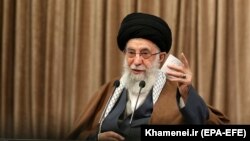Supreme Leader Ayatollah Ali Khamenei has reiterated Iran's "definite policy" that Washington must lift all sanctions if the United States and its allies want to see Tehran return to its commitments under a 2015 nuclear deal.
"Our position is clear and has not changed. All U.S. sanctions have to be lifted in accordance with the...agreement, and then we'll return to the nuclear deal," Khamenei said in a speech broadcast on state TV on March 21.
"The Americans must lift the sanctions, all the sanctions, and then we will verify and if they are truly lifted, then we will return to our JCPOA commitments," he said, using the acronym for the Joint Comprehensive Plan of Action.
Khamenei also repeated Tehran's position that "maximum pressure has failed" and warned that, if the Biden administration "wants to continue maximum pressure, they will fail as well."
U.S. President Joe Biden has signaled his readiness to revive the accord, but his administration insists Iran must first return to its nuclear commitments, most of which Tehran has suspended in response to US sanctions.
'Difficult, But Not Impossible'
The United States and the three European countries that signed the deal - Britain, France, and Germany - have suggested some changes that would allow Iran to come back, but Tehran has been skeptical.
The deal was meant to provide relief for Iran from international sanctions in exchange for limitations on its nuclear program, which Tehran says is strictly for civilian energy purposes.
The United States pulled out of the deal unilaterally in 2018 under former President Donald Trump, whose administration pursued a policy of "maximum pressure" on Iran over its nuclear and missile programs, as well as its support for regional proxies.
But Biden, who took office in January, has indicated that Washington would be willing to rejoin the JCPOA.
Complicating the matter, however, have been Iran's violations of the deal, including the amount of enriched uranium it can stockpile and the purity to which it can enrich it. Iran also last month began restricting International Atomic Energy Agency (IAEA) inspections of its nuclear facilities.
IAEA Director General Rafael Grossi has been talking to both sides and said earlier this month that he believed a U.S. return to the deal was possible.
"They want to come back," he said on March 16. "But of course...there are a number of issues that still need to be clarified. So it's not impossible. It is difficult, but not impossible."













